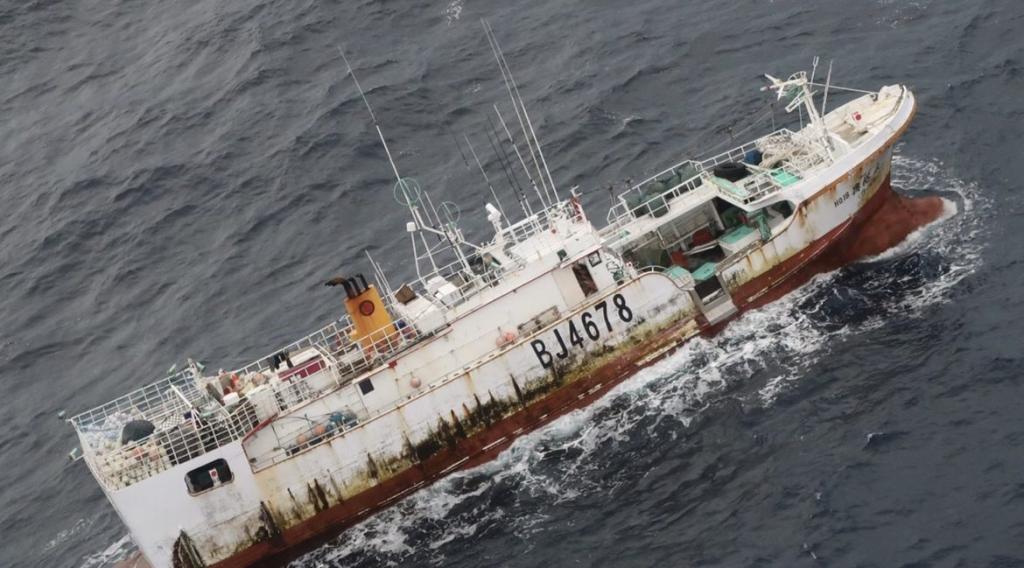
Did the spiritual beliefs of nine Indonesian fishermen influence their decision to abandon ship during a violent storm?
In Save Our Souls: The True Story of a Castaway Family, Treachery, and Murder, Matthew Pearl details the true story of a family shipwrecked with their crew in the Midway Atoll, also known as the Midway Islands. An intriguing part of the tale is that over the centuries hundreds of ships have wrecked or vanished in the Midways’ treacherous waters.
Pearl mentions the ships by name and one that caught my attention was the Yong Yu Sing No. 18. The disappearance of the Yong Yu Sing happened only five years ago in 2021. There were no details in Save Our Souls about the Yong Yu Sing’s disappearance, so I did a little digging. While the story was not covered by mainstream Western media, it can be found in obscure publications like the Taipei Times and Maritime Executive.
The Yong Yu Sing No. 18 was a commercial fishing boat out of Taiwan. In early January 2021, it went missing in the middle of the Pacific. A few days after the owners of the boat notified authorities, the ship was found several hundred miles northeast of the Midway Islands by a US search-and-rescue aircraft. The Yong Yu Sing was still afloat—but its Taiwanese captain and nine Indonesian crewmembers were nowhere to be found.
The stories show that the Yong Yu Sing had been in rough seas, yet no distress call was ever issued. A later inspection of the ship found a life raft missing. And while one news report speculated the entire crew may have been swept overboard in the stormy weather, what makes the story even more mysterious was that the ship was still afloat and seaworthy—albeit with damage to its hull and a few smashed windows.
These facts bring to mind a series of questions: Why, in a violent storm on the high seas, with waves crashing all around you, would you abandon a seaworthy ship for an inflatable life raft? Was the order given to abandon ship? If yes, why? And what was going through the heads of the crew members?
A glimpse of the spiritual beliefs of the Indonesian fisherman.
In Indonesia, 87% of the population is Muslim, primarily Suni Muslim. However, many locals have diverse and complex religious beliefs. Throughout the country, and especially in coastal areas, “local traditions and animistic beliefs” are often incorporated into their spiritual practices. If the term ‘animistic beliefs” has you scratching your head like it did me, this definition may help:
Animism (From Latin: anima meaning breath, spirit, life): the belief that objects, places, and creatures all possess a distinct spiritual essence or a soul.
Just like many Catholics in Haiti still practice Voodoo, Muslims in Indonesia believe in animism. These are deep-rooted ideas that predate Islam, based on the notion that the world is alive and infused with spiritual power. This spiritual power isn’t limited to living things like plants, animals and fish. It can extend to rivers, mountains, the weather, and even human-made objects—like ships. As a Wikipedia entry points out:
“Things” are not just passive objects but are considered to have their own agency, intentions, and feelings. A river might flood because it is angry, or a tree might be considered sacred due to the powerful spirit residing within it.
Among many Indonesians, there’s a deep sense of interconnectedness between humans and the natural world. Those who believe in animism likely believe that these spirits can influence the size of their catch, as well as their personal safety. If the spirits are in your favor, you will have good catch and, in time, you will return home safely. But if the spirits are not in your favor…
What about the name of the ship?
Today names are often used to identify boats and give them a personality. But since humans first started navigating the seas, ships have been given names for a mix of practical, spiritual, and cultural reasons. In earliest times, ships were often named after a god or goddess. Think Athena, Isis, Neptune, Poseidon. It was a way to honor a deity, hoping it would lead to favorable winds, calm seas, and a safe passage. It could also ward off evil spirits and bring success to a voyage.
But what about The Yong Yu Sing No. 18? For starters, the number 18 could indicate the number of a ship in a fleet or just be the owner’s favorite number. The meaning of “Yong Yu Sing” is more interesting. The phrase cannot be definitively translated into English, but it is roughly associated with prosperity, victory, or abundance. Google breaks down the possibilities as follows:
- Yong can mean “forever” or “perpetual,” and is also associated with concepts like “brave,” “strong,” and “courageous.”
- Yu can mean “abundant,” “rich,” or “plentiful.”
- Sing can mean “to rise,” “to flourish,” or “to prosper.”
Forever abundant and flourishing? Things certainly didn’t work out that way.
What was the crew thinking?
What caused the fishermen to believe that a life raft offered a better chance of survival than the ship? Could it be that their deep-rooted spiritual framework, where the natural world and even inanimate objects possess supernatural power, have swayed their decision? Or was this a practical but ultimately tragic decision made in response to severe natural forces?
My speculation: Confronted by a violent storm and a damaged vessel, the crew’s decision to abandon a seemingly seaworthy ship for a life raft might not have been a purely practical one. Instead, it’s plausible that their animistic beliefs led them to perceive the storm and the ship’s damage as a sign of angered spirits or an ill omen. This compelled them to seek favor and safety by leaving the Yong Yu Sing.
We will never know the precise thoughts of those nine Indonesian fishermen. But understanding the intricate tapestry of their spiritual world provides a powerful lens through which to interpret their desperate act in the face of the raging Pacific.













